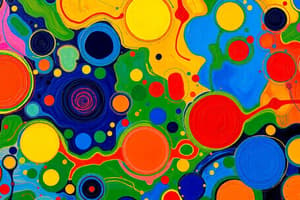Podcast
Questions and Answers
What is the definition of an arranged marriage?
What is the definition of an arranged marriage?
- A marital union where partners are chosen by a government agency
- A marital union where partners are chosen by someone other than themselves or outside their direct control (correct)
- A marital union where partners choose each other without external influence
- A marital union where partners are chosen by professional matchmakers
What defines a blended family?
What defines a blended family?
- A family unit consisting of individuals with diverse hobbies and interests
- A family unit consisting of a couple and their children from previous relationships, forming a new family structure (correct)
- A family unit consisting of individuals with mixed ethnic backgrounds
- A family unit consisting of individuals from different cultures
What characterizes an extended family?
What characterizes an extended family?
- A family structure that includes a single parent and their children
- A family structure that includes multiple generations living in separate households
- A family structure that includes only parents and children
- A family structure that includes not only parents and children but also other relatives like grandparents, aunts, uncles, and cousins (correct)
What is the definition of monogamy?
What is the definition of monogamy?
What is the definition of patriarchy?
What is the definition of patriarchy?
What is the focus of social exchange theory?
What is the focus of social exchange theory?
What does anthropology study?
What does anthropology study?
What is the definition of systems theory?
What is the definition of systems theory?
What is the definition of sociology?
What is the definition of sociology?
What does ethnocentrism mean?
What does ethnocentrism mean?
What is the focus of conflict theory?
What is the focus of conflict theory?
Flashcards
Arranged Marriage
Arranged Marriage
A marital union where partners are chosen by someone other than themselves, like parents or a matchmaker.
Blended Family
Blended Family
A family unit where a couple brings children from previous relationships together.
Extended Family
Extended Family
A family structure extending beyond parents and children to include aunts, uncles, grandparents, and cousins.
Monogamy
Monogamy
Signup and view all the flashcards
Patriarchy
Patriarchy
Signup and view all the flashcards
Social Exchange Theory
Social Exchange Theory
Signup and view all the flashcards
Anthropology
Anthropology
Signup and view all the flashcards
Systems Theory
Systems Theory
Signup and view all the flashcards
Sociology
Sociology
Signup and view all the flashcards
Ethnocentrism
Ethnocentrism
Signup and view all the flashcards
Conflict Theory
Conflict Theory
Signup and view all the flashcards
Study Notes
Family and Marriage
- An arranged marriage is a marriage where the partners are chosen by a third party, usually the parents or a matchmaker, rather than by the individuals themselves.
- A blended family is a family where one or both parents have children from a previous relationship, and the new partner becomes a stepparent to the children.
Family Structures
- An extended family is a family that includes relatives in addition to parents and children, such as grandparents, aunts, uncles, and cousins.
Marriage and Relationships
- Monogamy is a form of marriage where one person has only one spouse or partner at a time.
Sociological Concepts
- Patriarchy is a system of social organization in which men hold more power and dominate women, often in a family or society.
Theoretical Perspectives
- Social exchange theory focuses on the idea that people form relationships based on a cost-benefit analysis, where they weigh the benefits of a relationship against the costs.
- Conflict theory focuses on the role of power and conflict in shaping social relationships and institutions.
Fields of Study
- Anthropology is the study of human cultures, societies, and behaviors, including their development, variation, and similarities.
- Sociology is the study of human social behavior, relationships, and institutions, including the ways in which people interact and organize themselves.
Cognitive Biases
- Ethnocentrism is the tendency to view one's own culture as superior to others and to judge other cultures based on one's own cultural norms.
Systems Theory
- Systems theory is a theoretical approach that views social systems as composed of interrelated components that interact and adapt to their environment.
Studying That Suits You
Use AI to generate personalized quizzes and flashcards to suit your learning preferences.
Description
Prepare for the final exam with this study guide/review questions for HHS 4U1 Families In Canada. The exam will cover multiple-choice questions, true and false, and short/moderate answer questions based on the textbook 'Individuals and Families in a Diverse Society' with a focus on Unit 1: All in the Family.




